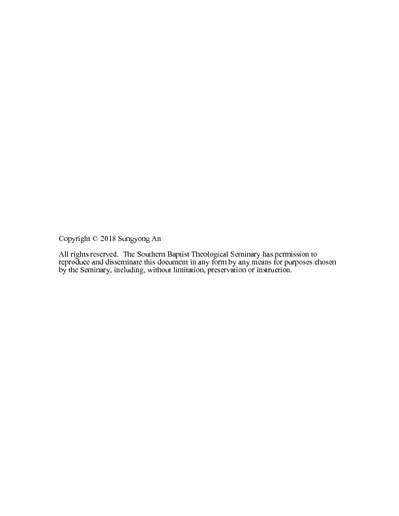| dc.description.abstract | The goal of this dissertation is articulating the integration of evangelism and social concern in Keller’s ministry. It also investigates if this integration is based on his understanding of the wholeness of the gospel.
The work has six chapters for achieving this objective. Chapter 1 treats introductory matters. It suggests the need for this study regarding the integration of evangelism and social concern because tension about the relationship between evangelism and social responsibility has existed for over a century. This chapter includes seven research questions, backgrounds, methodology, a limitation, and delimitations.
Chapter 2 reviews Keller’s life experiences that have shaped his understanding of the gospel and ministry. Because no works are currently published about Keller’s life, the introduction to his books, his sermons, and Redeemer’s home page constitute primary resources. This biography helps to grasp the development of his comprehension of the gospel, and his evangelism and social ministry integration.
Chapter 3 emphasizes clarifying Keller’s understanding of the gospel. His gospel definition is furnished. The chapter illustrates how he expounds his comprehension of the gospel with two frames. The first one has four themes: God, sin, Christ, and faith. It concerns what must I do to be saved? The second frame additionally has four themes: creation, the fall, redemption, and restoration. It answers what hope is there for this world? Keller contends they must be interwoven for biblical understanding of the gospel.
Chapter 4 elucidates why and how the gospel promotes personal and social impacts. The chapter demonstrates that radical gospel grace deals with the fundamental human problem—sin underneath sins. Thus, the gospel changes the human heart and motives, and ways the gospel brings about active engagement in social justice and cultural renewal.
Chapter 5 investigates how Keller’s understanding of the gospel shaped Redeemer Presbyterian Church five ministry areas: evangelism, community formation (discipleship), social justice, cultural renewal, and church planting.
Chapter 6 provides a brief summary and areas for further study. It concludes the dissertation with thoughts regarding Keller’s contributions to Christianity. | en_US |

